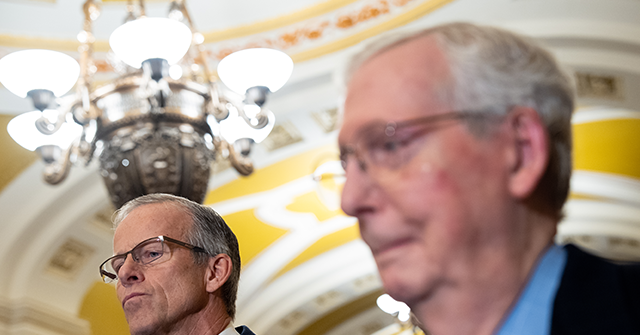Republicans Risk Economic Slump by Delaying Tax Cuts
The outlines of a Republican legislative agenda for Trump’s second term are beginning to take shape, but a key decision could send troubling signals to businesses and consumers. The party’s leadership appears to be leaning toward a delay of preserving and extending tax cuts in favor of other priorities.
Sen. John Thune (R-SD), set to take the reins as Senate majority leader, has floated the idea of using the Senate’s reconciliation process to fast-track a legislative package focused on border security, energy, and national defense. Reports from a recent closed-door meeting suggest Thune’s vision could sideline major tax reforms until later in 2025. This tactical decision carries significant economic risks.
Delaying tax cuts risks creating a cloud of uncertainty over their eventual passage. Businesses and consumers are now experiencing a surge in optimism, in part because they expect relief from the tax hikes promised by Harris. Hesitancy in Washington could fuel doubts that the cuts will materialize at all, leading to restrained investment and spending. The result? A self-inflicted drag on economic growth during a critical period.
The stakes are high. Republicans have touted the successes of the 2017 tax cuts as a cornerstone of Trump’s economic legacy, arguing that they unleashed growth by encouraging businesses to invest and consumers to spend. Failing to act quickly would send the opposite signal—one of indecision and unpredictability—that could undercut confidence just when Republicans are trying to demonstrate their economic stewardship.
Furthermore, reconciliation—a potent legislative tool that bypasses the filibuster—offers Republicans a rare opportunity to cement their agenda without Democratic interference. To use this leverage for measures that do not directly stimulate growth, while leaving tax policy in limbo, risks squandering momentum and weakening the political capital that a new presidency typically enjoys.
The Economy Fueled Trump’s Victory
Senator Thune’s caution is not completely without merit. Prioritizing national security and energy independence speaks to key Republican constituencies. But policymakers must consider the broader economic implications—not least because voters have clearly stated in every survey that the economy was the biggest issue influencing their votes in the recent election.
If Republicans intend to deliver on their promises of renewed prosperity, they would do well to remember that inaction—or even the perception of inaction—has consequences. Delay could jeopardize not only the credibility of the tax agenda but also the economic growth it is intended to support.
There’s also the risk that the Thune plan could go awry. Even though Americans favor mass deportations and secure borders, many veteran Republican lawmakers are still wedded to out-of-date support for cheap labor. Others may be cowed by the almost inevitable media campaign to demonize restrictive border policies and deportation. If the party splits on the first reconciliation bill over the issue of immigration, the resulting bad blood and demoralization could make a second reconciliation bill over taxes more difficult to pass.
The decision to pursue the repeal of Obamacare as the first major legislation of Trump’s first term almost derailed the tax cut agenda back in 2017. This should serve as a warning to the GOP not to assume the path to tax cuts will remain open.
Tariffs Without Tax Cuts Could Be Costly
What’s more, delaying tax cuts could put the Trump trade agenda at risk. Tariffs are likely to be paid for in part by changes in the relative value of currencies, with the dollar strengthening and export country currencies weakening. Some part of the tariff will likely be paid for in the form of narrower profit margins in U.S. businesses that import the products or materials for their products. Some may show up as higher prices for consumers—although any retail price increases are likely to be much smaller than the alarmists are forecasting.
Tax cuts on businesses and consumers can offset the domestic costs of tariffs. Delaying the tax cuts will likely mean that the tariffs will weigh on U.S. growth. And if the tax cuts never pass, there will be pressure from businesses and consumers to provide relief by reducing the tariffs.
This is a point that will not be lost on our trading “partners,” especially China. A delay in tax cuts will be seen as a sign of economic vulnerability and encourage foreign governments to attempt to wait out the tariffs, expecting the Trump administration to retreat if the economic costs become larger than expected. Enacting a tax cut immediately would have the opposite effect: sending the message that the U.S. government is serious about the Trump trade agenda and the economy is likely to stay strong enough to weather any threats of trade wars.
Republicans have a chance to set the tone for a pro-growth agenda in Trump’s second term by moving quickly on taxes. Now is not the time to put tax cuts on the back burner.
